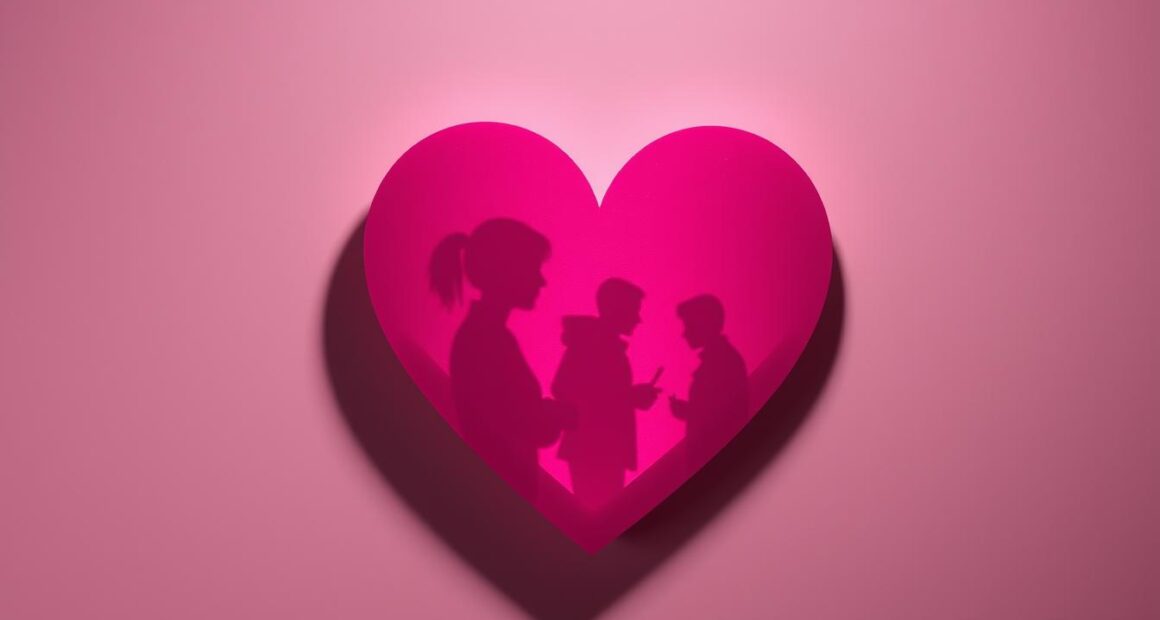Have you ever been at a crossroads in your relationship, wondering how much to sacrifice? You’re definitely not the only one. Many people face the tough waves of love, often doing too much to make their partner happy. In a world where ideals often beat reality, the extreme steps some take for love can surprise and teach us. It’s common to forget who you are for love’s sake, breaking important relationship rules. This can hurt your dignity and happiness. As you read, think about your own choices. What have you given up for love that now seems like a mistake?
Key Takeaways
- Internal growth is essential for finding an amazing partner.
- There is often an imbalance in romantic expectations, with many seeking perfection in partners while neglecting personal improvement.
- Neediness can negatively affect attractiveness in potential partners.
- Financial stress significantly impacts relationship dynamics and overall satisfaction.
- Engaging in diverse social activities can lead to improved dating opportunities.
- Self-reflection and nurturing self-esteem are vital for attracting healthy relationships.
- Understanding your energetic state can influence the quality of your relationships.
The Fascination Behind Love’s Limits
Exploring relationships pushes the boundaries of what we think is right. Each bond lets us explore love’s edges, shaping how we connect with others. These deep connections bring wonder and worry, leading to confusion at times. Studies show emotional struggles can make us feel 50% more uncertain. This happens as we battle doubt and desire.
Culture impacts who we choose to be with. Almost 70% say friends and family sway their choices. This shows how much pressure we feel from others about our sacrifices for love. This social effect can twist our idea of love. Facing big choices, like moving in together, 65% of people worry if they’re a good match, stirring up doubt.
Long-distance bonds are especially tough. Around 60% worry if their relationship can last, leading to emotional ups and downs. Anxiety can rise by 30%, hurting how we feel overall. About 45% face challenges with emotional gaps, making them question their relationship’s health.
More than 78% stay in relationships too long because of deep affection, even when seeing warning signs. This battle between mind and heart touches 55%, showing the emotional struggle of love. In the end, 72% of partners accept flaws, showing acceptance is key to lasting love.
Understanding Love-Blocking Mistakes
Relationships bloom when we’re true to ourselves. Learning about love-blocking errors is key to deep connections. These errors are hiding your real self, lying about what you want, and choosing safety over fun. They stop real closeness and leave you feeling empty.
Hiding Your True Self
Hiding who you are to seem more likable hurts relationship truth. It might draw someone in at first, but it leads to drifting apart. John Gottman’s studies show that not being open causes criticism and pulling away. Being open about who you are helps make the relationship stronger and safer.
Not Being Honest About Your Desires
Not sharing your true feelings leads to unhappiness. Keeping quiet to avoid fighting can build bitterness. Many relationship mistakes come from holding back our needs, which affects our mental health. It’s vital to speak clearly about what you want and need. This lowers the chance of confusion.
Prioritizing Security Over Adventure
Some people choose safety over excitement fearing they might lose their partner. While it’s good to be stable, lacking adventure can stop growth. Trying new things together brings you closer. Real bonds mean enjoying new adventures as a team. It makes relationships better.

What You Won’t Do For Love: Real Stories from Real People
Many people do amazing things for love. They share stories on platforms like Reddit about big sacrifices for their partners. Stories include moving cities, changing jobs, or shifting entire lives just for love.
These love experiences can bring joy but sometimes come with hard feelings. One story shares about someone giving up their dreams for their partner. This made them rethink their choices and mental health. It shows love can be tough when it comes to personal dreams.
Reading these, you see love and sacrifice can be confusing. People ask themselves, “How far would I go for love?” Everyone’s answer is different, shaped by their values and life situations. It reminds us love is strong but can also make us question our choices.

The Psychology of Love and Sacrifice
Studying love’s psychology shows how feelings and choices mix in relationships. People often choose poorly in love because they want acceptance or fear being alone. These love sacrifices, meant to please their partners, might not end well.
Why We Make Unhealthy Choices
Why love sacrifices might harm us involves looking into our minds:
- Fear of Loneliness: Fearing solitude, some don’t put their emotional needs first. This leads to compromises that harm them and their partners.
- Desire for Acceptance: Chasing love, people might ignore what’s important to them. They aim to keep the peace, losing sight of their values.
- Past Emotional Experiences: Old relationship habits can push people to keep making the same sacrifices. This can lessen the happiness that love offers.
Studies show sacrifices in love can be good or bad. A 2020 study found they can make relationships better and partners happier. But they often hurt the one sacrificing, as their partners might not see their efforts. This can lead to complicated feelings.
When partners often act selflessly, they’re more dedicated to each other. However, some sacrifices can create feelings of resentment or being undervalued, which may cause thoughts of breaking up. It’s vital to see and fix these patterns for healthier relationships.
| Factor | Impact on Sacrificer | Impact on Partner |
|---|---|---|
| Fear of Loneliness | Decreased personal well-being | Potential feelings of guilt |
| Desire for Acceptance | Compromise on values | Mixed emotions |
| Past Experiences | Repeated unhealthy patterns | Increased emotional strain |
| Altruistic Behaviors | Enhanced relationship satisfaction | Improved partner well-being |

The Role of Vulnerability in Relationships
Being open in love is key to forming strong bonds. Showing your true feelings helps build real closeness. Yet, many people avoid sharing their deep emotions. They stick to light topics to dodge feeling awkward. This fear of being vulnerable can block the path to deep connections.

Research highlights the good in being vulnerable. Sharing fears can make support from partners feel 50% stronger. However, 80% are scared of being rejected for showing their true selves. This fear stops many from opening up. It can cause misunderstandings about what each person needs and wants. Not talking about deep feelings means you might miss 75% of your partner’s true emotions.
“Vulnerability is essential for fostering deeper emotional connections in relationships.”
Talking about tough things, like past betrayals, can make you feel safer in love. Studies show vulnerability makes relationships 75% more satisfying. It helps you share feelings in a healthy way. This builds trust and respect with your partner.
Still, many hesitate to share real feelings because of past hurts. A lot of us don’t speak up when we’re upset. Filling this communication gap can make relationships much better. It leads to happier, more fulfilling connections.
| Findings on Vulnerability | Impact |
|---|---|
| Genuine vulnerability enhances relationships | Increases satisfaction by up to 65% |
| Open expressions of feelings | Improves emotional intimacy by 75% |
| Discussing fears reduces associated anxiety | Decreases fear by over 40% |
| Closed-off communication leads to dissatisfaction | Increases unfulfillment risk to about 60% |
| Open discussions about insecurities | Provide a 60% increase in feelings of security |
Embracing vulnerability leads to deeper, more rewarding relationships. Being open invites a greater understanding. It lays the foundation for connections that are strong, trusting, and supportive.
Setting Boundaries: Are You Doing It Right?
Building healthy boundaries is key to happy relationships. But, lots of people have a hard time spotting warning signs that signal boundary issues. If not handled well, this can cause lots of stress and shows why it’s crucial to talk effectively in relationships.
Recognizing Red Flags
Catching warning signs early can prevent bigger issues later. Some major red flags to watch for include:
- Controlling behavior: Feeling forced to change to please someone else hints at boundary problems.
- Lack of respect: If someone ignores how you feel or what you need, that’s a big warning sign.
- Frequent criticism: Constantly feeling put down shows a lack of respect in the relationship.
How to Communicate Your Needs
Talking openly is crucial in making sure everyone feels valued. To share your needs effectively:
- Be clear and specific: Don’t be vague. Tell your partner exactly what you need from them.
- Use “I” statements: Talk about how things make you feel, not what your partner is doing wrong. For instance, say “I feel left out when decisions are made without me.”
- Practice active listening: Make sure both of you take time to listen and understand each other.

| Boundary Type | Healthy Examples | Unhealthy Examples |
|---|---|---|
| Time | Making time for yourself | Always putting your partner’s needs before your own |
| Emotional | Being able to share your feelings openly | Hiding how you feel to avoid disagreements |
| Physical | Talking about what makes you comfortable physically | Ignoring your own discomfort to keep the peace |
The Importance of Self-Love and Authenticity
Self-love is the key to a healthy love life. It means putting your needs and feelings first. This creates a solid base for real connections with others. Knowing this can change how you see and handle your relationships.
About 85% of people find it hard to accept themselves at some time. This common problem greatly affects how we relate to ourselves and others. Over 70% often criticize themselves, hurting their emotional health. Seeing the connection between self-love and real relationships can stop this harmful cycle.

In our world, where we often seek others’ approval, nearly 90% look for validation because they feel not good enough. This need can harm the quality of your love life. But, research says 65% feel closer to their loved ones when they are true to themselves, not just trying to fit in. Feeling good about who you are helps keep your relationships strong.
Here are some main points on self-love and being true to yourself:
- About 60% of adults make choices that don’t reflect their true value.
- People with high self-esteem are 50% more likely to help their community. This shows how good it can be for everyone.
- Setting clear personal limits can lower stress and anxiety by up to 50%.
- Practicing self-love and setting boundaries can reduce anxiety and depression symptoms by 30%.
Loving yourself leads to better self-relationships and more honesty in love. Accepting and loving yourself helps create meaningful romantic bonds. True personal honesty builds trust and respect, letting love grow. Being consistently true to yourself is crucial for close, genuine connections with others.
Real-Life Examples of Love Triumphing Against All Odds
There are many real stories showing how love beats big challenges. They not only give us hope but also show how strong love is in overcoming problems. Despite tough times, couples’ strong bonds lead them to do great things.
In an exciting game, Alabama’s college basketball team almost beat the odds against Minnesota. They almost won, despite being 15 points down and only having three players left. This showed their spirit and how love and hard work can make the unlikely possible.
Michael Jordan’s success teaches us the power of not giving up. He missed thousands of shots but kept trying, showing that failure can lead to success. His story reminds us that facing and learning from difficulties is key in relationships too.
People love stories about underdogs winning, which is why movies like Rocky are so popular. These stories are important in our culture and show how much we value fighting spirit. The wedding industry also shows that people believe in lasting love, making it a huge business.
Here’s a summary table of compelling factors surrounding real-life love success stories:
| Aspect | Example | Impact |
|---|---|---|
| Underdog Achievement | Alabama’s Basketball Comeback | Highlighted determination despite setbacks |
| Continuous Improvement | Michael Jordan’s Career | Failure as a stepping stone to success |
| Cultural Narratives | Rocky and Similar Films | Society’s admiration for resilience and triumph |
| Emotional Investment | Wedding Industry | Hope and commitment reflected in financial engagement |

Many couples show they can overcome anything with courage and support for each other. Their stories prove that true love can beat the odds. They inspire everyone that relationships need both partners to be committed and work together.
When Love Becomes Toxic: Signs to Look For
It’s important to know when love turns harmful for your mental health. A good relationship makes you feel supported and happy. But, a toxic one can hurt your well-being. Spotting signs of manipulation early can stop things from getting worse.
Common Signs of Emotional Manipulation
Emotional manipulation can be hard to see but very harmful over time. Here are signs to watch for:
- Gaslighting: This is when someone makes you doubt your feelings or what you see, causing confusion.
- Excessive Control: Your partner might try to control who you see or where you go.
- Withholding Information: Not sharing important details with you can make you feel lost and dependent.
- Playing the Victim: They might always act as the victim to twist your emotions.
- Love-Bombing: Starting with a lot of love and attention, then pulling away, creates instability.
How to Protect Yourself
Taking steps to keep your relationship healthy is key. Here’s how you can protect yourself:
- Recognize Your Worth: Knowing how much you’re worth helps you see toxic behavior.
- Communicate Openly: Talk about your feelings freely, without being scared of how they’ll react.
- Establish Boundaries: Make it clear what you will not put up with.
- Seek Support: Have friends and family around who respect you and care about your well-being.
- Trust Your Instincts: If something feels wrong, it’s okay to think more about it.

Spotting these signs and taking steps to guard against them can help you find healthier relationships. It’s crucial to put your emotional health first when dealing with love.
Conclusion
We’ve dived deep into love’s complexities and uncovered key lessons. These lessons focus on the importance of being real and open, and loving oneself. They guide us toward forming healthier connections. Reflect on love, understanding your needs and setting clear boundaries. Healthy relationships are built on respect and good communication.
Think about your own love experiences. Ask yourself if you’re staying true to who you are or changing for someone else. Love is about growing together and feeling appreciated. It involves discovering more about yourself and your partner. This ensures love stays rewarding and lasting.
Love’s journey isn’t only about what you give up. It’s also about the happiness and bond you create. Using these insights helps you understand your relationships better. Aim for a love that makes your life better and supports your soul.









